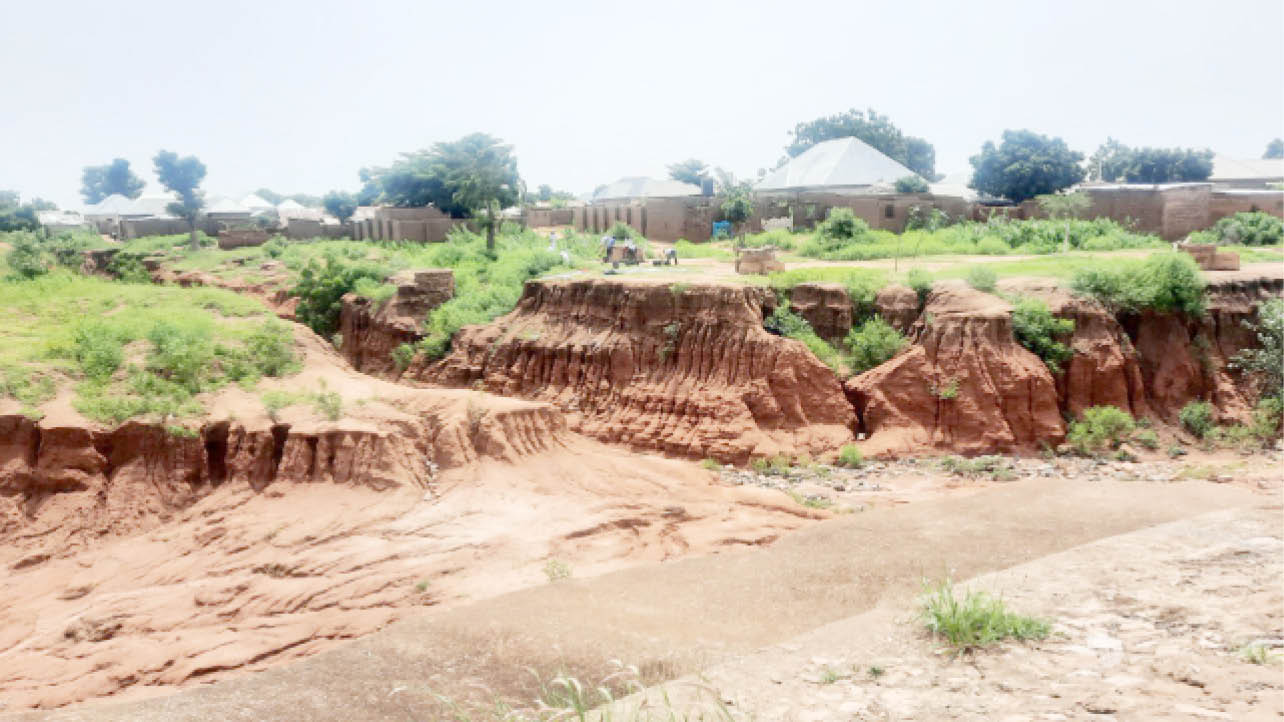Gombe community battles gully erosion, acute water supply
Kwami town is located in Kwami Local Government Area of Gombe State, about 10 kilometres north of Gombe city, along the Gombe-Dukku highway. The town is believed to have been established over 100 years ago. Oyetola reconstructs 13.15km Ada-Igbajo road after 30-year neglect NIGERIA DAILY: 2021: How Insecurity Held Nigeria By The Jugular […]

Residential areas threatened by the erosion
Kwami town is located in Kwami Local Government Area of Gombe State, about 10 kilometres north of Gombe city, along the Gombe-Dukku highway.
The town is believed to have been established over 100 years ago.
- Oyetola reconstructs 13.15km Ada-Igbajo road after 30-year neglect
- NIGERIA DAILY: 2021: How Insecurity Held Nigeria By The Jugular
As a result of the surge in the population in Gombe city, several civil servants and other people conducting various businesses in the capital city, now reside in the town due its proximity.
However, despite its history and the strategic location, people of Kwami have been battling with a huge valley that surrounds the town, which is believed to be created by a gully erosion for over 22 years now.
The unfortunate development submerged several farmlands and residential areas, thereby leaving hundreds of people homeless and forcing several others to relocate to other places.
Malam Abdullahi Mahmuda, an official of the Kwami Development Association, told North East Trust that if measures are not taken, the erosion will chase them away from their ancestral homes.
“The Kwami town is located on a major waterway coming from the western part of Gombe State, it was the water that emptied into the Dadin Kowa River, at the eastern part of the state.
“The valley started to encroach into our houses and farmlands and posed a threat to the people of Kwami around 1999 during the tenure of former Governor Abubakar Habu Hashidu, when a serious erosion was recorded that almost dislodged people living at the northern part of Kwami town.
“That particular valley has submerged several farmlands over the years. As a result, most people have lost their ancestral farmlands and are forced to abandon farming, which is their only means of livelihood,” Malam Mahmuda narrated.
He added that apart from farmlands, the gully has also destroyed several houses at the eastern part of the town, forcing several people to abandon their houses to rent houses in other parts of the town or stay with their relatives. This has threatened major roads that linked the town with other parts of the state.
According to him, some years ago, the people of Kwami realised some funds through individual donations and constructed an embankment that surrounded the town from the western part.
“It was that embankment that greatly reduced the force of the water, especially during the raining season and it was what saved people of Kwami from relocating at that time,” he said.
The Kwami Development Association official added that despite constructing the embankment, the town is still under the threat of flooding whenever it rains, “because the town is situated on a water passage and it is predicted that if nothing is done, the water may force us to leave the town completely.”
He explained that in order to save the town and its residents, the government should construct a good drainage system in all the waterways that passed through the town.
“We are appealing to the government to please look at our pains and save the lives of numerous people living in the town. This will enable us bequeath a good environment habitable for our unborn children,” Mahmuda said.
A resident of Kwami, Malam Ibrahim Abdullahi, told North East Trust that apart from the erosion problem, the Kwami LGA is also in dire need of rural roads that will connect several villages to make life more comfortable for them.
“We are appealing for the construction of rural roads in Tappi, Diri villages and the ongoing Jar Kwami roads that will connect such places with major towns in Kwami West like Bojude and Gadam.
“It would give the rural dwellers, who are mostly farmers, easy access to take their farm produce like vegetables, tomatoes, pepper and onions among others to the markets,” he said.
North East Trust learnt that aside the valley and erosion problem, the people of Kwami also faced problem of acute shortage of water supply for domestic usage.
A resident of the town, Malam Abubakar Musa said they spent over N1.6 million monthly to buy water from commercial water tanks during dry seasons.
“For now, our only means of getting water for domestic usage is through commercial water tanks that are bringing the water from Kwadon town. During dry seasons, we use about 25 tankers daily in Kwami town alone.
“And during the dry season, it is even difficult to get the water and each tank cost us about N2,200, that is about N55,000 monthly. Therefore, having portable water from the water board even twice in a week will significantly reduce our hardship,” he said.
Abubakar added that the location of the town made it difficult for the residents or even government to dig boreholes.
“During the administration of former Governor Ibrahim Hassan Dankwambo, pipelines were laid from Dadin-Kowa up to Kwami, what remains now is connecting the pipes into the town to make the water accessible to people of Kwami in their respective homes.”
